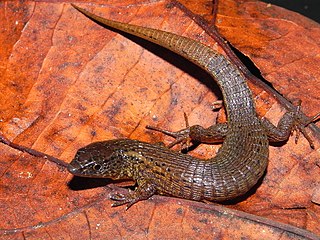
Alopoglossus is a genus of lizards in the monogeneric family Alopoglossidae. The genus is distributed from Costa Rica in Central America to northern South America.
Apollo Amazonius was a cultic epithet of the Greek god Apollo, under which he was worshiped, and had a temple at Pyrrhichus in Laconia. The name was derived either from the belief that the mythological Amazons had penetrated into the Peloponnese region as far as Pyrrhichus, or that they themselves had founded Apollo's temple there.
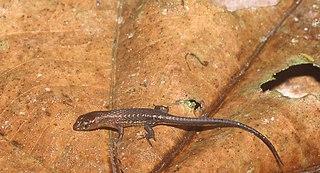
Alopoglossus angulatus, known commonly as the northern teiid, is a species of lizard in the family Alopoglossidae. The species is endemic to northern South America.
Alopoglossus atriventris, known commonly as the keel-bellied shade lizard, is a species of lizard in the family Alopoglossidae. The species is endemic to northwestern South America.
Alopoglossus buckleyi, also known commonly as Buckley's shade lizard and Buckley's teiid, is a species of lizard in the family Alopoglossidae. The species is native to northwestern South America.
Alopoglossus copii, known commonly as the drab shade lizard, is a species of lizard in the family Alopoglossidae. The species is native to northwestern South America.
Alopoglossus embera is a species of lizard in the family Alopoglossidae. The species is endemic to western Colombia.

Alopoglossus festae is a species of lizard in the family Alopoglossidae. The species is native to northwestern South America.
Alopoglossus lehmanni is a species of lizard in the family Alopoglossidae. The species is endemic to western Colombia.
Alopoglossus meloi is a species of lizard in the family Alopoglossidae. The species is endemic to northern Brazil.
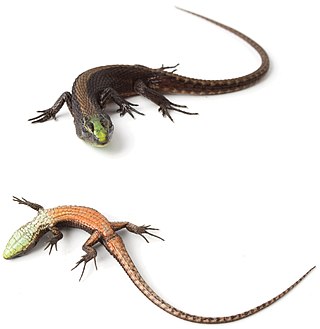
Alopoglossus viridiceps, known commonly as the green-headed shade lizard, is a species of lizard in the family Alopoglossidae. The species is endemic to Ecuador.
Alopoglossus bilineatus is a species of lizard in the family Alopoglossidae. It is found in Colombia and Ecuador.
Alopoglossus brevifrontalis, Boulenger's largescale lizard, is a species of lizard in the family Alopoglossidae. It is found in Ecuador, Peru, Bolivia, Brazil, Colombia, Venezuela, Guyana, and Suriname.
Alopoglossus myersi is a species of lizard in the family Alopoglossidae. It is found in Panama, Colombia and Venezuela.
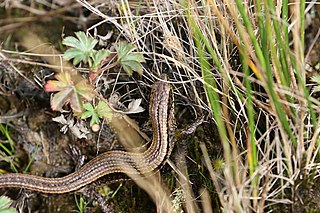
Alopoglossus plicatus, Taylor's largescale lizard, is a species of lizard in the family Alopoglossidae. It is found in Costa Rica, Panama, and Colombia.

Alopoglossus vallensis is a species of lizard in the family Alopoglossidae. It is endemic to Colombia.
Alopoglossus theodorusi is a species of lizard in the family Alopoglossidae. It is found in the eastern Guiana Shield, in French Guiana and northern Brazil. The specific name honors the herpetologist Theodorus Willem van Lidth de Jeude.
Alopoglossus tapajosensis is a species of lizard in the family Alopoglossidae. It is found in Brazil.
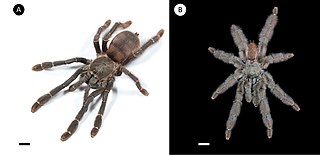
Amazonius burgessi is a tarantula in the Amazonius genus, it was first described by Martin Hüsser in 2018. It is found in Leticia, Colombia and Iquitos, Peru, although it is likely also found in Ecuador. It is named after Joseph Burges, who helped to collect important material for this study. It is fairly commonly bred and kept in captivity, with its common name being the Ghost Tree Spider. As the name suggests, it is an arboreal tarantula, and usually has a skittish behavior.

Amazonius is a genus of tarantulas first described by Cifuentes & Bertani in 2022. They are found in Venezuela, Colombia, Peru, Ecuador, Brazil and French Guiana. Two of the four species were originally from the Tapinauchenius genus, being A. burgessi, A. elenae.





